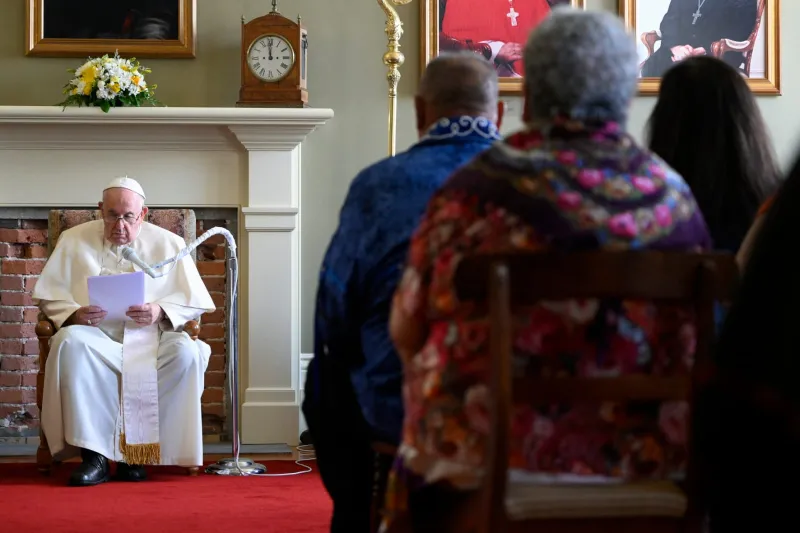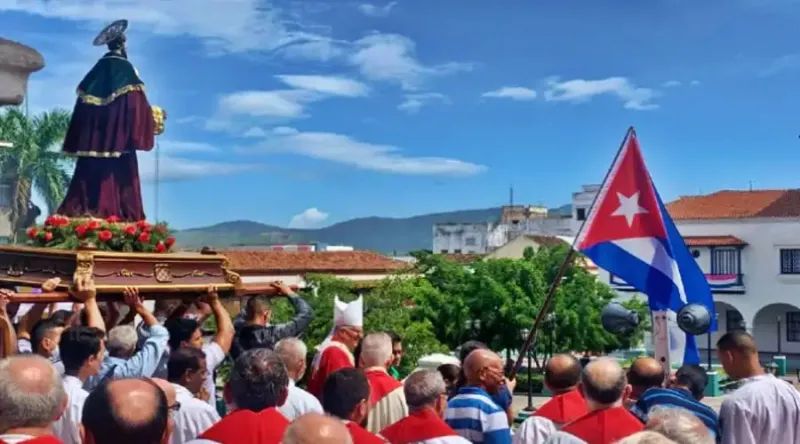
Money, Vanity, and Eternity
Readings: • Ecc 1:2; 2:21-23 • Ps 90:3-4, 5-6, 12-13, 14, 17 • Col 3:1-5, 9-11 • Lk 12:13-21 I know Christians who believe that people should be able to be as wealthy as they […]

Readings: • Ecc 1:2; 2:21-23 • Ps 90:3-4, 5-6, 12-13, 14, 17 • Col 3:1-5, 9-11 • Lk 12:13-21 I know Christians who believe that people should be able to be as wealthy as they […]

Father Felipe Vélez Jiménez, the pastor of St. Gerard Maria Majella parish in the town of Iguala, was shot in the cheekbone right while driving his vehicle in Chilapa county, in the State of Guerrero, on July 28, 2022. / Courtesy of the Diocese … […]

Episcopal Installation of Bishop Robert Barron as the Ninth Bishop of the Diocese of Winona-Rochester / Co-Cathedral of St. John the Evangelist YouTube
Washington D.C., Jul 29, 2022 / 14:21 pm (CNA).
Bishop Robert Barron, the founder of the Cat… […]

 Pope Francis address representatives of Canada’s indigenous peoples at the archbishop’s residence in Québec City. / Vatican Media
Pope Francis address representatives of Canada’s indigenous peoples at the archbishop’s residence in Québec City. / Vatican Media
St. Louis, Mo., Jul 29, 2022 / 11:22 am (CNA).
In a brief address Friday to delegates representing nine indigenous nations of Canada, Pope Francis said he is returning home “greatly enriched” after his weeklong “penitential pilgrimage” to Canada, during which he publicly apologized several times for past abuses perpetrated by Catholics against the nation’s indigenous.
“I have come as a brother, to discover firsthand the good and bad fruit borne by members of the local Catholic family in the course of the years. I have come in a spirit of penance, to express my heartfelt pain at the wrong inflicted on you by not a few Catholics who supported oppressive and unjust policies in your regard,” the 85-year-old pope said, addressing the group gathered at the archbishop’s residence in Québec City.
The policies to which Pope Francis is referring relate to Canada’s residential school system, which during more than 100 years of operation worked to systematically stamp out indigenous culture and language, often by removing children from their families by force. Catholic organizations ran at least 60% of the government-funded schools.
“I have come as a pilgrim, despite my physical limitations, to take further steps forward with you and for you. I do this so that progress may be made in the search for truth, so that the processes of healing and reconciliation may continue, and so that seeds of hope can keep being sown for future generations — indigenous and non-indigenous alike — who desire to live together, in harmony, as brothers and sisters,” the pope continued.
He thanked the indigenous people for welcoming him to Canada. The 22 delegates in attendance Friday represented the Mi’kmaq, Algonquin, Mohawk, Cree, Innu, Atikamekw, Malecite, Abenaki, and Naskapi nations.
“I can truly say that, while I came to be with you, it was your life and experiences, the indigenous realities of these lands, that have touched me, remained with me, and will always be a part of me,” the vicar of Christ said.
“I dare say, if you will allow me, that now, in a certain sense, I also feel a part of your family, and for this, I am honored,” he added.
As he first did in his apology speech on Monday, Pope Francis again praised the importance that indigenous communities put on family and tradition. He also developed this theme on Tuesday on the feast of St. Anne, the patron saint of grandparents.
“In a world that, tragically, is often all too individualistic, how precious is your profoundly genuine sense of family and community. How important it is to cultivate properly the bond between young and old, and to maintain a healthy and harmonious relationship with all of creation!” the pope said.
Pope Francis continued his speech by highlighting the example of three women who he said “best understand how to protect the most important things in life.” The first was St. Anne, who raised the Virgin Mary; the second was Mary herself, the Mother of God, and finally St. Kateri Tekakwitha, the first Native American to be canonized and a member of the Mohawk people.
Both Mary and St. Kateri “received from God a plan for their lives, and, without asking any man, courageously assented to it,” the pope said.
“Those two women could have responded irately to anyone who opposed that plan, or simply submitted to the patriarchal rules of the time and given up, without battling for the dreams that God himself had inspired in them,” he continued. “They chose not to do that, but instead, with meekness and determination, with prophetic words and decisive gestures, they blazed a trail and accomplished what they had been called to do.
“May they bless the journey we now share, and intercede for us and for this great work of healing and reconciliation that is so pleasing to God. I bless all of you from my heart. And I ask you, please, to continue to pray for me,” the Holy Father concluded.
After the address, Pope Francis was scheduled to fly to Iqaluit, the capital and only city of Nunavut, Canada’s northernmost and most sparsely populated territory, arriving there at 3:50 p.m. EDT. After meeting with former students of Canada’s residential schools in Iqaluit, he will depart for Rome at 6:45 p.m.

Bishop Earl Boyea of the Diocese of Lansing commended Michigan football coach Jim Harbaugh for his public comments against abortion. / Diocese of Lansing
Denver, Colo., Jul 29, 2022 / 10:46 am (CNA).
After Michigan football coach Jim Harbaugh m… […]

When G.K. Chesterton was received into the Catholic Church one hundred years ago, on Sunday, July 30, 1922, it was big news. Except it wasn’t. It didn’t quite qualify as “news” because nobody knew about […]

Cardinal Silvano Maria Tomasi. / Martin Micallef/Maltese Association Order of Malta via Flickr.
Rome Newsroom, Jul 29, 2022 / 09:17 am (CNA).
The Order of Malta is unique and not only a spiritual body. It is a sovereign entity under internation… […]

null / Daniel Ibanez/CNA.
Cordoba, Spain, Jul 29, 2022 / 05:00 am (CNA).
The bishop of Córdoba, Spain, Demetrio Fernández, warned about the challenges facing the Synod on Synodality, an initiative that he acknowledges “has stirred up the waters… […]

 Cuban Catholics process with a statute of St. James on July 25, 2022, the saint’s feast day, in Santiago de Cuba, Cuba. / Facebook page of Archdiocese of Santiago de Cuba
Cuban Catholics process with a statute of St. James on July 25, 2022, the saint’s feast day, in Santiago de Cuba, Cuba. / Facebook page of Archdiocese of Santiago de Cuba
Denver Newsroom, Jul 29, 2022 / 03:46 am (CNA).
A large number of Catholics from the Archdiocese of Santiago de Cuba participated in a procession July 25 to celebrate the feast of their patron, St. James the Apostle.
The special event also commemorated the 507th anniversary of the founding of Santiago (St. James) de Cuba.
Archbishop Dionisio García Ibáñez, who was joined by almost all the archdiocese’s clergy, celebrated a Mass the same day in the Basilica Cathedral of Our Lady of the Assumption. “Teenagers from various parishes in the city” helped organize the Mass, the archdiocese noted on its website.
In his homily, García recalled the time when the Spanish founded the city and placed it under the patronage of St. James.
“They came with two desires: the desire for wealth, and for power, but also to spread the faith,” he said. “May that desire for power disappear in us, and may what remains be the desire for justice, for good, for fidelity, for the love of God, for being witnesses of Christ in the midst of difficulties,” he said.
In addition, the prelate recalled the example of the city’s patron and asked Cuban Catholics to imitate “his strength and decision” to evangelize and bring hope to the archdiocese and the entire island of Cuba, especially during difficult times.
“In the midst of difficulties we have to give hope, and hope is only achieved, not in human promises that you know well may or may not be achieved, but in Christ Jesus,” he said.
Jesus Christ “will be with us and guides us in the midst of joy and turbulence. He is leading us to encounter him,” he added. If all Cubans followed the example of the saint, the city “would be a beautiful place in justice, in charity, in peace.”
Qué el Señor guarde nuestra Ciudad!!!
Posted by Arzobispado de Santiago de Cuba on Monday, July 25, 2022
García encouraged prayer for the Cuban people, “to be more faithful every day” and especially for their political authorities.
“We have to pray for our city, for the authorities so that they always seek the good of the citizens, respecting their rights, their freedom, and their desire for progress, their work, that their decisions may be just in order to seek the good of all citizens,” he said.
After the Mass, the participants processed with the cathedral’s statue of St. James to the atrium of the church where the prelate blessed the city of Santiago de Cuba.
In mid-July, Father Bladimir Navarro, who resides in Spain, told the pontifical foundation Aid to the Church in Need (ACN) that the situation in Cuba has worsened “very much” since the historic protests of July 11, 2021, when Cubans from different cities on the island took to the streets to protest the “economic misery” and the fear and repression of freedom that they have suffered for decades.
In Cuba “if you raise your voice and tell the truth, they come after you, they defame you,” Navarro reported. The priest stated that many young people, including minors, who protested “are in jail” and that the sentences in several cases exceed 10 years. “They only asked, ‘We want freedom, we want life; we want to live and we don’t want to (just) survive,’” he said.
On July 17, before the saint’s feast day, Archbishop García asked the Virgin Mary to move the hearts of those responsible for the imprisoned Cubans, so they can be released.
This story was originally published by ACI Prensa, CNA’s Spanish-language news partner. It has been translated and adapted by CNA.

The overturn of Roe v. Wade should be a cause of celebration for all Catholics and people of good will. Alas, Catholics remain divided along political lines of left and right, while Americans cannot even […]
© Catholic World Report